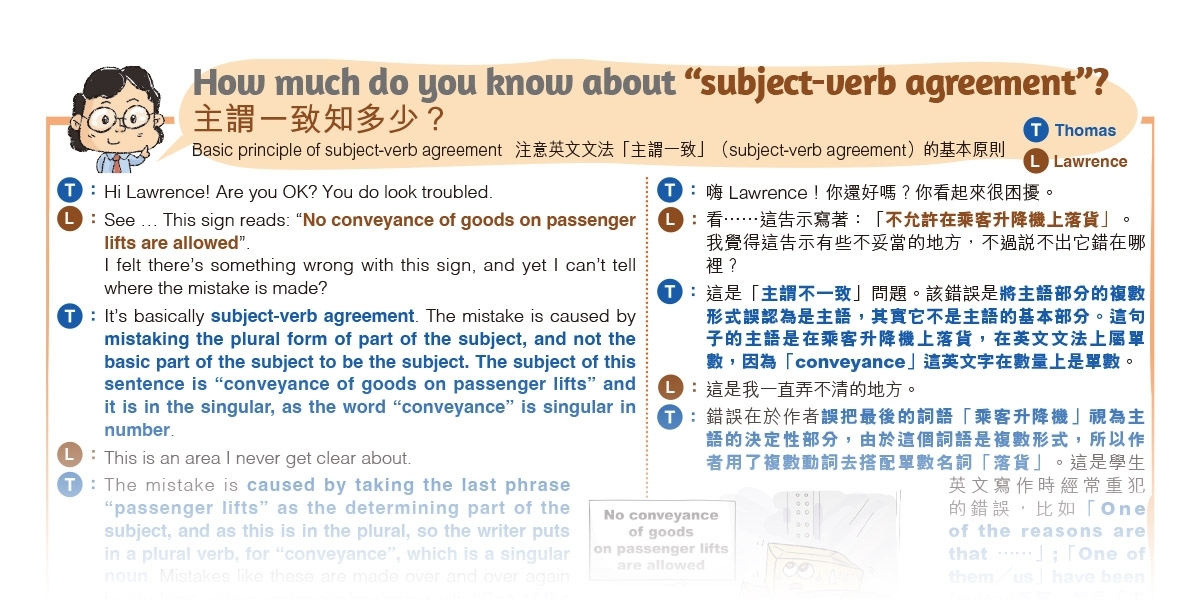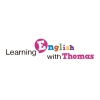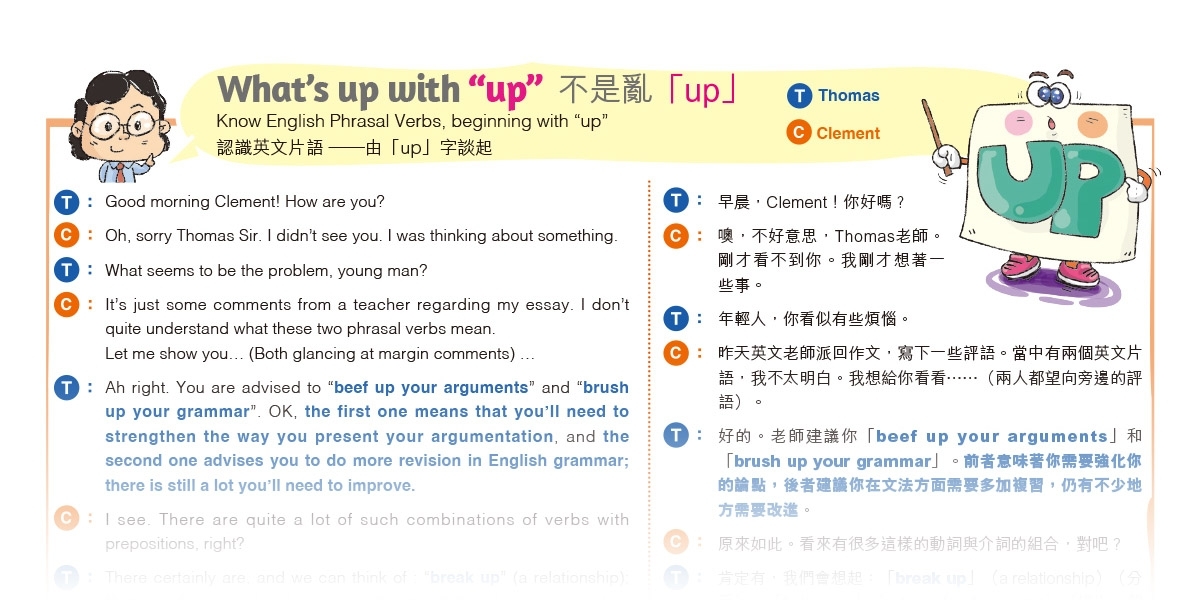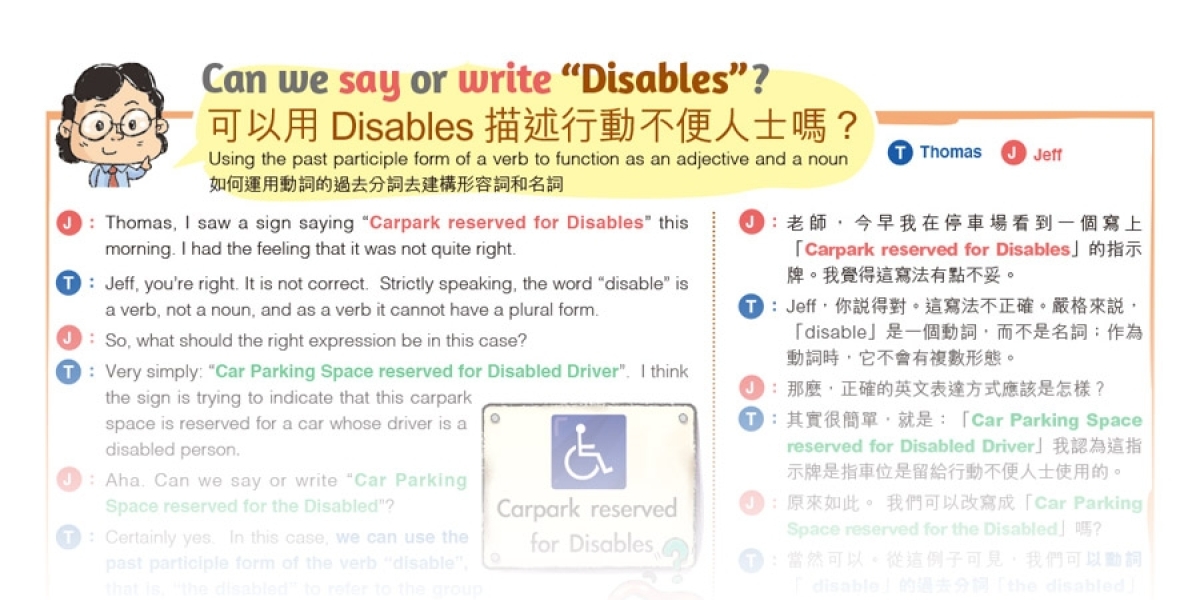昔日文章


Learning English with Thomas
2023.03.12
How much do you know about “subject-verb agreement”?
主謂一致知多少?
Basic principle of subject-verb agreement 注意英文文法「主謂一致」(subject-verb agreement)的基本原則
T: Thomas L: Lawrence
T: Hi Lawrence! Are you OK? You do look troubled.
L: See … This sign reads: “No conveyance of goods on passenger lifts are allowed”. I felt there’s something wrong with this sign, and yet I can’t tell where the mistake is made?
T:
It’s basically subject-verb agreement. The mistake is caused by mistaking the plural form of part of the subject, and not the basic part of the subject to be the subject. The subject of this sentence is “conveyance of goods on passenger lifts” and it is in the singular, as the word “conveyance” is singular in number.
L: This is an area I never get clear about.
T:
The mistake is caused by taking the last phrase “passenger lifts” as the determining part of the subject, and as this is in the plural, so the writer puts in a plural verb, for “conveyance”, which is a singular noun. Mistakes like these are made over and over again by students writing sentences beginning with “One of the reasons are that ……”; “One of them/us” have been invited”, and so on. All these are examples of mistakes in subject-verb agreement.
L: From now on I will avoid making mistakes in this area.
T: 嗨 Lawrence!你還好嗎?你看起來很困擾。
L: 看……這告示寫著:「不允許在乘客升降機上落貨」。我覺得這告示有些不妥當的地方,不過說不出它錯在哪裡?
T: 這是「主謂不一致」問題。該錯誤是將主語部分的複數形式誤認為是主語,其實它不是主語的基本部分。這句子的主語是在乘客升降機上落貨,在英文文法上屬單數,因為「conveyance」這英文字在數量上是單數。
L: 這是我一直弄不清的地方。
T: 錯誤在於作者誤把最後的詞語「乘客升降機」視為主語的決定性部分,由於這個詞語是複數形式,所以作者用了複數動詞去搭配單數名詞「落貨」。這是學生英文寫作時經常重犯的錯誤, 比如「One of the reasons are that ……」;「One of them╱us」have been invited等等,都是「主謂不一致」的例子。
L: 今後我會盡量避免出現這方面的錯誤了。


Learning English with Thomas
2023.02.05
What’s up with “up” 不是亂「up」
Know English Phrasal Verbs, beginning with “up”
認識英文片語 ——由「up」字談起
T : ThomasC C : Clement
T: Good morning Clement! How are you?
C: Oh, sorry Thomas Sir. I didn’t see you. I was thinking about something.
T: What seems to be the problem, young man?
C: It’s just some comments from a teacher regarding my essay. I don’t quite understand what these two phrasal verbs mean.
Let me show you… (Both glancing at margin comments) …
T: Ah right. You are advised to “beef up your arguments” and “brush up your grammar”.
OK, the first one means that you’ll need to strengthen the way you present your argumentation,
and the second one advises you to do more revision in English grammar; there is still a lot you’ll need to improve.
C: I see. There are quite a lot of such combinations of verbs with prepositions, right?
T: There certainly are, and we can think of : “break up” (a relationship); “bring up” (a topic for discussion); “look up” (the dictionary); and so on.
C: Thanks so much, Thomas Sir. I’ve got to go now. Tell me more next time.
T: 早晨,Clement!你好嗎?
C: 噢,不好意思,Thomas老師。剛才看不到你。我剛才想著一些事。
T: 年輕人,你看似有些煩惱。
C: 昨天英文老師派回作文,寫下一些評語。當中有兩個英文片語,我不太明白。我想給你看看……(兩人都望向旁邊的評語)。
T: 好的。老師建議你「beef up your arguments」和「brush up your grammar」。前者意味著你需要強化你的論點,
後者建議你在文法方面需要多加複習,仍有不少地方需要改進。
C: 原來如此。看來有很多這樣的動詞與介詞的組合,對吧?
T: 肯定有,我們會想起:「break up」(a relationship)(分手);「bring up」(a topic for discussion)(提出一個課題作討論);
「look up」(the dictionary)(查字典) 等等。
C: 十分感謝你,Thomas老師。我現在要走了。下次再多加指點。


Learning English with Thomas
2022.11.20
“Makes your home comes true” —— correct or not?
「Makes your home comes true」—— 是對,還是錯﹖
Correct use of the verb “make” with infinitives 正確使用英文動詞“Make”的不定式(infinitives)
T : Thomas t : Tony
T : Tony, morning! How are you doing lately?
t : Could be better.
T : You do sound troubled.
t : It’s only this crazy grammar making me fail in drill exercises all the time, especially using infinitives together with verbs like make, let, help, and so on. Can I show you a picture? Is the language there in this ad correct?
T : Ah, it reads “(something) Makes your home comes true”. It’s wrong grammatically, because when you use the verb make, like in this case, the other verb that comes after it must be an infinitive without “ to” and cannot be another main verb.
t : How should it be corrected?
T : It should be “(whatever that may be that) makes your home come true”. For one thing, there can only be one main verb in a sentence, so the other verb-like items must be either infinitives or participles.
t : Very clear now. Thanks so much!
T : 早晨,Tony!你近來好嗎?
t : 可以更好。
T : 聽起來你好像有煩惱。
t : 這些英文文法令我經常在作業練習中犯錯,尤其是使用動詞的不定式,如make、let、help等等。我想你幫我看看這圖片,相中的廣告的用語使用正確嗎?
T : 啊,上面寫著 「(某事)Makes your home comes true」。在語法上而言,這表達是錯誤的。因為當你使用動詞make時,它後面的另一個動詞必定是不定式,不能使用「to」,並且它不能充當另一個主要動詞。
t : 應該怎樣改寫﹖
T : 正確寫法應該是「makes your home come true」。 有一點必須謹記,英文句子中只能有一個主要動詞,因此在同一句子中貌似動詞的詞彙,必須以不定式(infinitives)或分詞(participles)形式出現。
t : 我現在很清楚了。感謝你的指導!


Learning English with Thomas
2022.10.30
Can we say or write “Disables” ?
可以用Disables 描述行動不便人士嗎?
T: Thomas J=Jeff
Using the past participle form of a verb to function as an adjective and a noun
J: Thomas, I saw a sign saying “Carpark reserved for Disables” this morning. I had the feeling that it was not quite right.
T: Jeff, you’re right. It is not correct. Strictly speaking, the word “disable” is a verb, not a noun, and as a verb it cannot have a plural form.
J: So, what should the right expression be in this case?
T: Very simply: “Car Parking Space reserved for Disabled Driver”. I think the sign is trying to indicate that this carpark space is reserved for a car whose driver is a disabled person.
J: Aha. Can we say or write “Car Parking Space reserved for the Disabled”?
T: Certainly yes. In this case, we can use the past participle form of the verb “disable”, that is, “the disabled” to refer to the group of people under description, like “the rich”, “the poor”, “the privileged”, etc. See?
J: Loud and clear, Sir. And thank you, Sir.
如何運用動詞的過去分詞去建構形容詞和名詞
J: 老師, 今早我在停車場看到一個寫上「Carpark reserved for Disables」的指示牌。我覺得這寫法有點不妥。
T: Jeff,你說得對。這寫法不正確。嚴格來說, 「disable」是一個動詞,而不是名詞;作為動詞時,它不會有複數形態。
J: 那麼,正確的英文表達方式應該是怎樣?
T: 其實很簡單,就是:「Car Parking Space reserved for Disabled Driver」我認為這指示牌是指車位是留給行動不便人士使用的。
J: 原來如此。 我們可以改寫成「Car Parking Space reserved for the Disabled」嗎?
T: 當然可以。從這例子可見,我們可以動詞「 disable」的過去分詞「the disabled」來描述一個群體, 例如: 「t h e r i c h 」(富人) ,「the poor」(窮人), 「the privileged」(特權人士) 等等,明白嗎?
J: 你的解釋很清楚。謝謝老師。


